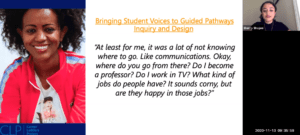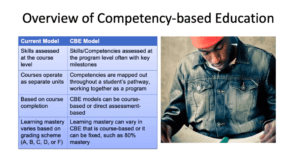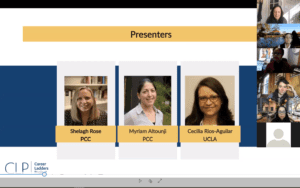Practitioners from colleges across the state convened virtually on November 13 and 20 for Redesigning with Equity and Careers in Mind, a two-part series of GP workshops focused on strategies and evidence-based practices to remove barriers to equitable program enrollment and completion.
Scroll down to access recordings and slides from the workshops and breakout sessions. You’ll also find a list of resources at the bottom of the page.
Equity in Program Enrollment and Outcomes
 In the first GP workshop in the two-part series, we heard from Dr. Hana Lahr, Senior Research Associate at the Community College Research Center (CCRC) about CCRC’s recent work to uncover racial disparities in program choice, enrollment, and completion. This was followed by a panel discussion, Q&A session, and small group breakouts.
In the first GP workshop in the two-part series, we heard from Dr. Hana Lahr, Senior Research Associate at the Community College Research Center (CCRC) about CCRC’s recent work to uncover racial disparities in program choice, enrollment, and completion. This was followed by a panel discussion, Q&A session, and small group breakouts.
Access the recording or view the slide presentation.
Panelists included:
-
- Dr. Abdimalik A. Buul, Counseling Faculty, San Diego City College
- Jackie Cruz, Vice President of Advancement and Development, Hartnell College
- Jennifer Johnson, Instructional Faculty, Nursing, Bakersfield College
- Dr. Patricia Ramos, Dean of Workforce and Economic Development, Santa Monica College
- Dr. Cecilia Rios-Aguilar, Professor and Associate Dean of Equity, Diversity and Inclusion, UCLA School of Education and Information Studies
- Michelle Simotas, Instructional Faculty, English, City College of San Francisco
Strategies and Practices for Equitable Enrollment and Completion
In the second GP workshop, we convened in breakout sessions to explore how college practitioners implemented specific strategies and evidence-based practices. Sessions included:
Competency-based Education: A Flexible Approach to Learning
 Competency-based Education (CBE) is a flexible approach to teaching and learning. Students earn certificates and degrees by demonstrating they have mastered knowledge and skill and are able to apply them. This breakout included discussion of varying forms of CBE, including direct assessment and course-based CBE, as well as non-credit and full degree pathways. Practitioners from San Diego Continuing Education, Los Angeles Trade Tech, and the Academic Senate shared how they are implementing CBE and the potential of CBE as an equity and anti-poverty strategy. View recording and slides.
Competency-based Education (CBE) is a flexible approach to teaching and learning. Students earn certificates and degrees by demonstrating they have mastered knowledge and skill and are able to apply them. This breakout included discussion of varying forms of CBE, including direct assessment and course-based CBE, as well as non-credit and full degree pathways. Practitioners from San Diego Continuing Education, Los Angeles Trade Tech, and the Academic Senate shared how they are implementing CBE and the potential of CBE as an equity and anti-poverty strategy. View recording and slides.
-
- Cheryl Aschenbach, Secretary, Academic Senate for California Community Colleges
- Dr. Carlos Cortez, President, San Diego Continuing Education
- Jess Guerra, Director, Transportation Workforce Institute, and Chair, Advanced Transportation and Manufacturing, Los Angeles Trade Tech
Implementing Credit for Prior Learning as an Equity Strategy
Credit for Prior Learning (CPL) enables learners to obtain credit for college-level knowledge and skills gained outside of college or university courses, through industry credentials, public service academies, military service or other means. In this breakout session, practitioners from Norco College and Palomar College provided an overview of CPL as an equity strategy, especially for working adults and veterans. Participants in this session also broke into three subtopic discussion groups:
(Click on the titles above to view recordings for individual discussion groups. There is a single slide deck for all three; bookmarks indicate the starting slide for each subtopic.)
-
- Norco College: Janelle Brekke, Senior Academic Evaluations Specialist; Dr. Peggy Campo, Professor Anatomy and Physiology; Mark DeAsis, Dean, Enrollment Services; and Terrence Nelson, Project Director, MAP
- Palomar College: Ben Mudgett, Articulation Officer and Associate Professor; Nichol Roe, Associate Dean of Workforce Development and Extended Studies; and Candace Rose, CPL Coordinator/Associate Professor
Creating Community: Cohorts and Guided Pathways
In this breakout session, college presenters and attendees explored ways cohorts can be used as a vehicle to create community and deliver support services and other interventions. Practitioners from Hartnell College and Skyline College demonstrated the potential of cohorts as a mechanism for guided pathways intervention strategies including work-based learning opportunities, meta major communities, specialized counseling, career exploration, and transitions from K-12 and to four-year institutions. View recording and slides.
-
- Jackie Cruz, Vice President of Advancement and Development, Hartnell College
- Ellen Murray, Director, Promise Scholars Program, Skyline College
Identity and Asset-based Approaches to Career Development
 Career decisions have lifelong consequences. Therefore, supporting and advising students, particularly low-income students of color, through the career decision-making process is a high-stakes activity that requires: understanding the complexity of community college students’ decision-making processes, validating the knowledge and skills that they bring to college, and use of asset-based institutional practices. In this session, practitioners shared contextual data about the labor market faced by students and presented an example of how Pasadena City College in partnership with UCLA worked to break silos to support students’ career exploration. View recording and slides.
Career decisions have lifelong consequences. Therefore, supporting and advising students, particularly low-income students of color, through the career decision-making process is a high-stakes activity that requires: understanding the complexity of community college students’ decision-making processes, validating the knowledge and skills that they bring to college, and use of asset-based institutional practices. In this session, practitioners shared contextual data about the labor market faced by students and presented an example of how Pasadena City College in partnership with UCLA worked to break silos to support students’ career exploration. View recording and slides.
-
- Dr. Myriam Altounji, Counselor, Pasadena City College
- Dr. Cecilia Rios-Aguilar, Professor and Associate Dean of Equity, Diversity and Inclusion, UCLA School of Education and Information Studies
- Shelagh Rose, Professor, Pasadena City College
Onboarding and Student Supports Centered on Equity
Closing equity gaps in college completion is a key goal of guided pathways and the system’s Vision for Success. But if we ask the question “Who completes which programs?” then that begins to delve into issues of equity in program enrollment and outcomes. Colleges are reimagining student supports and the onboarding experience in order to set students up for college and career success from their earliest engagements with the college. In this breakout, MiraCosta College and Long Beach City College led discussion of their work to ground counseling in equity, integrate career counseling with student success teams and academic communities, and deepen alignment and professional development across K-16 segments. View recording and slides.
-
- Long Beach City College: Brenda Galvez, Faculty Intern; Lupe Pasillas, Program Supervisor, Student Success, and Support; and Elijah Sims, Intervention Coordinator and Counselor
- MiraCosta College: Dr. Wendy Stewart, Dean of Counseling and Student Development
Resources
A short video produced in conjunction with last spring’s career-focused GP workshop, features Dr. Cecilia Rios-Aguilar, professor of education and the associate dean of Equity, Diversity, and Inclusion at UCLA’s Graduate School of Education and Information. Dr. Rios-Aguilar shared how students make career choices and how Guided Pathways can support students based on their experiences. Highlights and materials from the workshop are also available.
CLP’s brief, Bringing Student Voices to Guided Pathways Inquiry and Design, shares findings from student focus groups at two colleges. See the appendix for the protocol used in the focus groups.
GP stories offer snapshots of promising practices that California community colleges are using to redesign their programs and structures. These one-page narratives cover a range of topics such as: designing with careers in mind, including student voices in GP redesign, supporting students from a distance, and more.
Examples of GP redesign profile colleges and detail major transformations showing early or promising results. You can find two-page redesign examples on topics including counseling, student supports, onboarding, orientation, student success teams, and early career exploration.
CLP’s Design Guide for Integrating Student Supports provides information and strategies to redesign key areas of the student’s journey–onboarding, the first year, and counseling. Each section includes guiding principles, key components, college examples, and a “Getting Started” guide.
The CLP brief, Better Careers at Hartnell College: Creating a System to Connect College to Career, describes Hartnell College’s plans to scale its innovative work developing strong connections from college to career for its agricultural, health, and education students through pathways that include work-based learning and internships.
CLP convened a small group of college leaders, university partners, and workforce partners to help develop the workshop content. These workshops were produced by the Career Ladders Project with funding from the California Community Colleges Chancellor’s Office.